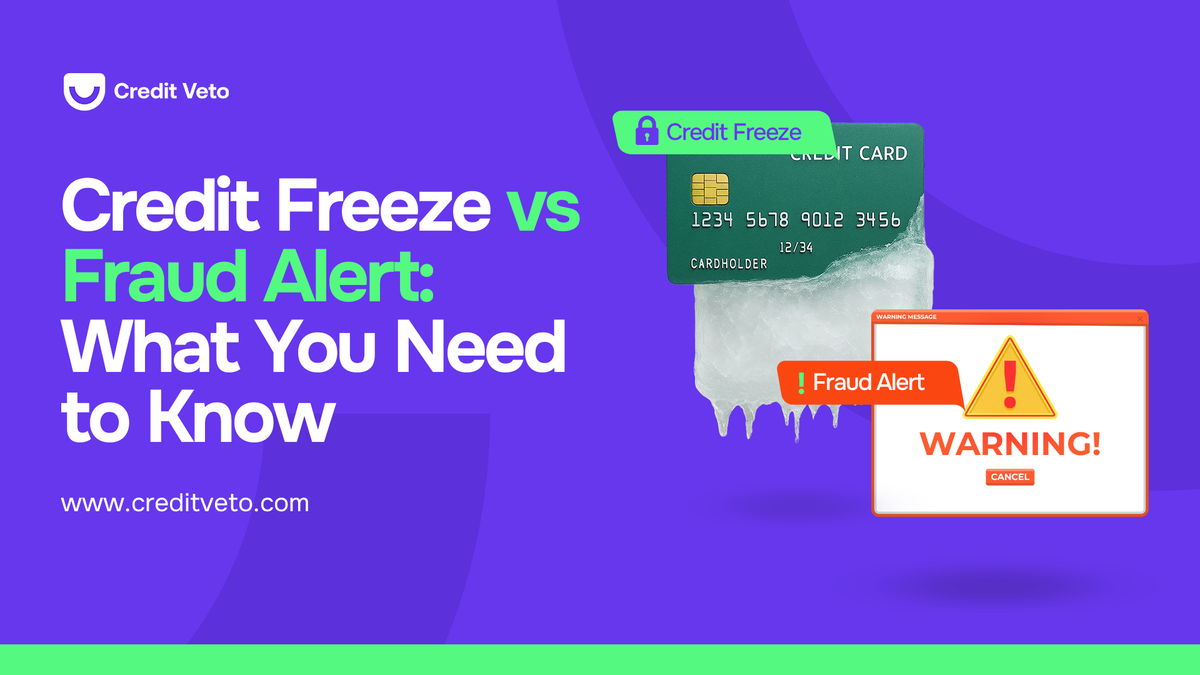Credit Freeze vs Fraud Alert: What You Need to Know
Credit freeze vs fraud alert? Learn the key differences, when to use each, and how to protect your credit from identity theft before it’s too late.

Imagine waking up one day to find someone opened a credit card in your name, took out a loan, or even tried to buy a house—all without your knowledge. Scary, right? Identity theft isn’t just a nightmare; it’s a real risk millions face every year. But what can you do to protect yourself? Two of the most talked-about tools are credit freezes and fraud alerts.
You're in the right place if you’re wondering which one to use, when, or how they differ. Understanding these can save your credit and peace of mind and help you avoid costly mistakes.
When it comes to protecting your credit, credit freezes and fraud alerts are often confused or used interchangeably. But they serve different purposes, have distinct effects, and can impact your credit access differently.
This guide breaks down the key differences between a credit freeze vs fraud alert, explains when each makes sense, and shares tips on how to use them together for the strongest protection. We’ll also cover some low-difficulty keywords like property fraud alert reviews and factor trust freeze to keep you ahead of the curve.
By the end, you’ll be equipped to make smart choices that keep your credit safe and accessible only to you.
What Is a Credit Freeze?

A credit freeze, also known as a security freeze, is a powerful tool that gives you full control over who can access your credit report. It works by completely locking down your credit file, which means no lender, creditor, or third party can view it unless you permit them.
Think of it like installing a deadbolt on your credit card only when you hold the key. With growing concerns around identity theft, especially after major data breaches, a credit freeze is one of the most effective ways to protect yourself from financial fraud.
What Happens When You Freeze Your Credit?
When you place a credit freeze, no new credit accounts can be opened in your name. That includes credit cards, loans, lines of credit—even some apartment leases or cellphone plans that require a credit check. Because lenders can’t access your report, they won’t approve new applications. This shuts the door on identity thieves who might try to use your information to take out credit in your name.
What’s important to note is that a freeze does not affect your credit score, nor does it block your access to existing credit. You can still use your current cards, pay your bills, and monitor your report as usual.
How Do You Freeze Your Credit?
Freezing your credit is surprisingly simple and completely free. You’ll need to contact each of the three major credit bureaus individually:
- Equifax Credit Freeze
- Experian Credit Freeze
- TransUnion Credit Freeze
Each credit bureau will ask you to create a secure PIN or password. This PIN is what you’ll use later to lift or “thaw” the freeze temporarily when you need to apply for new credit.
Pro Tip: Freeze your FactorTrust report too, a lesser-known credit bureau used by alternative lenders. Adding a Factor Trust freeze adds another layer of protection, especially if you’re dealing with payday loan companies or subprime lenders.
Who Should Use a Credit Freeze?
Credit freezes aren’t just for people already dealing with fraud; they’re a proactive tool for anyone serious about protecting their credit. You should strongly consider freezing your credit if:
- You’ve been a victim of identity theft or had personal information exposed in a data breach
- You’ve received suspicious emails or calls suggesting your SSN or credit info is at risk
- You’re not planning to apply for new credit anytime soon
- You want to make sure your kids’ credit reports (yes, they have them) are locked and protected
If you’re especially concerned about property fraud, like someone attempting to refinance or claim ownership of your home, combining a credit freeze with property fraud alert reviews is a smart move. These alerts notify you if any legal action is filed using your property, offering peace of mind for homeowners.
In short, a credit freeze gives you control, security, and peace of mind. It’s one of the few tools that stops fraud before it starts, without impacting your score. And in today’s world, that kind of protection is worth everything.
What Is a Fraud Alert?

A fraud alert is a special warning placed on your credit report that signals to lenders and creditors they need to take extra steps before approving any new credit in your name. Unlike a credit freeze, a fraud alert does not block access to your credit report. Instead, it acts like a bright caution sign, telling lenders to verify your identity carefully before moving forward.
This makes fraud alerts a smart choice for people who want protection without the full lockdown of a freeze.
Types of Fraud Alerts
There are two main types of fraud alerts you can place on your credit file:
- Initial Fraud Alert: This alert lasts for one year and is designed for anyone who suspects they may be a victim of fraud or identity theft. It’s a good starting point if you notice suspicious activity but haven’t confirmed fraud.
- Extended Fraud Alert: Lasting for seven years, this alert is available to victims of confirmed identity theft who have filed a police report. It offers a stronger level of protection by requiring lenders to be even more vigilant.
How Does a Fraud Alert Work?
When a lender or creditor pulls your credit report and sees a fraud alert, they must contact you directly to confirm your identity before approving any new credit. This verification step helps catch potential fraudsters who might be trying to open accounts using your personal information.
Fraud alerts don’t prevent credit checks altogether, they simply add a layer of security by making sure lenders don’t approve applications without your knowledge.
Who Should Use a Fraud Alert?
Fraud alerts are ideal if you:
- Think you’re at risk of identity theft but still want to apply for new credit occasionally without the hassle of a full freeze.
- Want a lighter, more flexible layer of protection that’s easier to manage than a freeze.
- Need a quick way to alert lenders of potential fraud without blocking credit access.
For people who want to balance protection with convenience, fraud alerts offer an effective middle ground. They allow your credit to be checked (so you can apply for loans or credit cards) while adding important identity verification steps to keep thieves at bay.
Using both a fraud alert and credit freeze can give you the most comprehensive security, blocking unauthorized access while ensuring lenders know to verify your identity carefully.
If you’re concerned about your credit safety or want to learn more about tools like property fraud alert reviews or a factor trust freeze, Credit Veto offers guidance and monitoring solutions to help you stay one step ahead.
Credit Freeze vs Fraud Alert: The Key Differences
When Should You Use a Credit Freeze?
- After your identity has been stolen or you suspect a serious breach
- If you don’t plan to apply for new credit for a while (e.g., you’re focused on repairing existing credit)
- When you want maximum control and protection
- After a property fraud alert review reveals suspicious activity related to your real estate or property records
When Should You Use a Fraud Alert?
- If you suspect potential fraud or identity theft but still need to apply for credit soon
- When you want a lighter, more flexible layer of protection
- If you want to alert lenders without completely blocking credit inquiries
- When you want to monitor your credit but avoid the hassle of freezing and unfreezing multiple times
Can You Use Both Together?
Absolutely! Many experts recommend using both tools for layered security:
- Start with a fraud alert to warn lenders and monitor for suspicious activity
- Upgrade to a credit freeze if you detect fraud or want to lock down your credit fully
Using both increases your protection and reduces the risk of unauthorized accounts while maintaining some flexibility.
Understanding Property Fraud Alerts and Factor Trust Freeze
Two additional tools can help protect your credit and property:
- Property Fraud Alert Reviews This alerts you if someone tries to fraudulently transfer or take out a mortgage on your property. It’s a specialized alert to protect your home and real estate investments from identity thieves.
- Factor Trust Freeze FactorTrust is a lesser-known credit reporting agency specializing in alternative credit data. Freezing your FactorTrust report adds another layer of protection for consumers, especially those with limited traditional credit history.
Real-Life Example: How a Credit Freeze Saved a Client
One of our clients—Sheila—had her identity stolen after a phishing scam. Thieves tried to open multiple credit cards and take out a personal loan. Because she had a credit freeze in place, none of these new accounts could be opened. The freeze gave her time to catch the fraud, dispute the attempts, and secure her identity.
How to Set Up a Credit Freeze or Fraud Alert
- Credit Freeze: Visit the websites of Equifax, Experian, and TransUnion to request a freeze. You will get a PIN to unfreeze when needed.
- Fraud Alert: Contact one of the credit bureaus to place a fraud alert. They are required to notify the other bureaus. No PIN needed.
FAQs
Q: Will a credit freeze affect my existing accounts?
No. It only prevents new credit from being opened. Your current credit cards and loans remain active.
Q: Does a fraud alert stop all credit checks?
No. It only requires lenders to take extra steps to verify your identity.
Q: Can I remove a credit freeze or fraud alert?
Yes. You can lift or remove either by contacting the credit bureaus and verifying your identity.
Q: Is there any cost for freezing or placing a fraud alert?
No. Federal law requires these services to be free.
Conclusion
Understanding the difference between a credit freeze vs fraud alert is essential to protecting your credit and peace of mind. While a freeze locks down your credit entirely, a fraud alert warns lenders to be cautious—both are powerful tools when used wisely.
If you want to take control of your credit protection, start by placing a fraud alert or freeze today. Need help or want to monitor your credit regularly? Try Credit Veto’s free credit monitoring tools for 7 days and join our 5x5 Challenge to build stronger credit habits.
Protect your credit, protect your future.




Comments ()